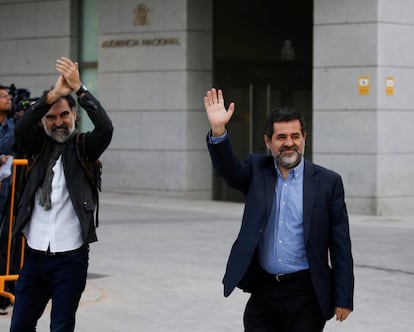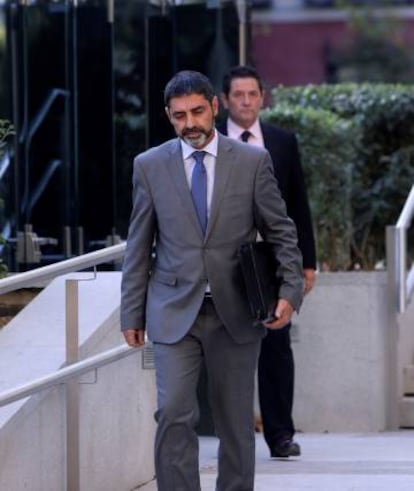Two Catalan independence leaders taken into custody in sedition probe
Heads of grassroots pro-secession groups ANC and Òmnium being investigated over September 20 events
A judge from Spain’s High Court, the Audiencia Nacional, last night ordered two leaders of pro-Catalan independence organizations to be held in prison without bail as part of a court investigation into the pair over possible sedition.

Jordi Sànchez and Jordi Cuixart – the leaders of the civic groups National Catalan Assembly (ANC) and Òmnium, respectively – spent their first night in jail last night due to their alleged role in the events of September 20 and 21. They are suspected of organizing protests on those dates aimed at stopping Civil Guard operations in Catalonia to seize material destined to be used at the October 1 illegal independence referendum in the northeastern Spanish region.
Earlier on Monday evening, the same judge had decided not to jail the head of the Mossos d’Esquadra regional police force, Josep Lluís Trapero, imposing instead precautionary measures such as taking his passport away and making him show up at court every two weeks.
The same judge decided not to jail the head of the Mossos d’Esquadra regional police force
The pro-independence movement reacted angrily at the news. The Catalan government said that the judge’s decision to keep ANC and Òmnium leaders in custody was the Popular Party (PP)’s reaction to Catalan authorities’ offer of talks, expressed on Monday through a letter sent by Catalan premier Carles Puigdemont to Spanish PM Mariano Rajoy. This letter failed to answer the central government’s question of whether independence has indeed been declared in Catalonia or not, following an ambiguous declaration made on Tuesday of last week.
Meanwhile, the ANC sent pot-banging protesters out on the streets, and called workplace stoppages for Tuesday, as well as a candlelight demonstration at the corner of Passeig de Gràcia and Diagonal Avenue in Barcelona. The city mayor, Ada Colau, described the decision to jail Cuixart and Sánchez as “an outrage.”
Cuixart and Sànchez were sent to preventive prison without bail after the former opted not to speak before the judge in court and the second would only answer questions from his lawyer, Jordi Pina, who argued that all of the mobilizations led by his client were of a peaceful nature.

The magistrate, however, classed both pro-independence leaders – who in the past have been behind major marches such as the “Diada,” held on Catalonia’s “National Day” on September 11 – as the principal promoters and directors of the protests on September 20 and 21.
Those days saw more than 40,000 people take to the streets, having been encouraged to do so via social networks and ANC and Òmnium. Many congregated outside the regional government’s economy department, to protest against the arrest of 11 senior figures from the Catalan administration who were allegedly behind the logistics of the illegal referendum.
The altercations that took place during the protest posed serious difficulties for the court-ordered operations. A Barcelona court secretary present at the searches was forced to leave the economy department via a rooftop and later mingle among patrons who were leaving a theater next door. The protestors, meanwhile, destroyed three Civil Guard all-terrain vehicles that were on the site, causing damages valued at €135,600.
The judge found that Cuixart and Sànchez were at the forefront of the protests all day, directing and encouraging the crowds outside the economy department, inciting them to stay on the site and “giving orders” on how to act at all times.
The protestors destroyed three Civil Guard all-terrain vehicles
The judge said that the events of September 20 and 21 “were not an isolated citizen protest,” but rather were “part of a complex strategy” in which Cuixart and Sànchez have been working together for some time “in the execution of a road map designed to obtain the independence of Catalonia.”
The High Court judge believes that the events of September 20 and 21 were “very serious” and constitute the offense of sedition. The aim of the protest, the magistrate stated, was to “impede” functionaries from the justice system and Civil Guard officers complying with the orders of a judge. And after that objective, their aim was to “achieve the celebration of the referendum” on October 1, which had been suspended by the Constitutional Court, and proclaim the Catalan republic.
English version by Simon Hunter.
Tu suscripción se está usando en otro dispositivo
¿Quieres añadir otro usuario a tu suscripción?
Si continúas leyendo en este dispositivo, no se podrá leer en el otro.
FlechaTu suscripción se está usando en otro dispositivo y solo puedes acceder a EL PAÍS desde un dispositivo a la vez.
Si quieres compartir tu cuenta, cambia tu suscripción a la modalidad Premium, así podrás añadir otro usuario. Cada uno accederá con su propia cuenta de email, lo que os permitirá personalizar vuestra experiencia en EL PAÍS.
¿Tienes una suscripción de empresa? Accede aquí para contratar más cuentas.
En el caso de no saber quién está usando tu cuenta, te recomendamos cambiar tu contraseña aquí.
Si decides continuar compartiendo tu cuenta, este mensaje se mostrará en tu dispositivo y en el de la otra persona que está usando tu cuenta de forma indefinida, afectando a tu experiencia de lectura. Puedes consultar aquí los términos y condiciones de la suscripción digital.








































